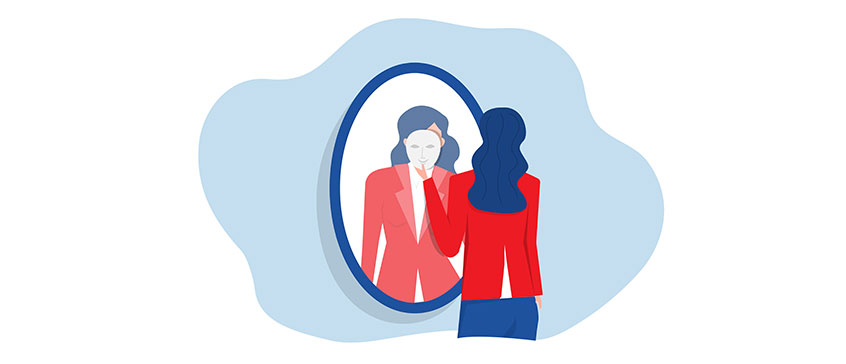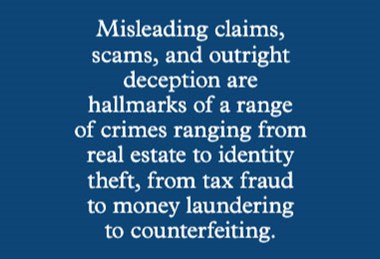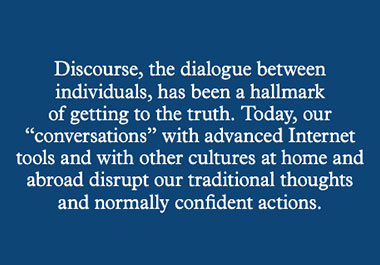Home / Communication and Public Relations / Fraud within us
Fraud within us

By Nigel Atkin
Nigel is the founding member and a long-standing instructor of the Public Relations diploma program.
This article is featured in the 2023 winter edition of The Scrivener. The Scrivener is the tri-annual magazine of the BC Notaries Association that publishes articles about points of law and the notary profession.

We live in an ocean of information where we need to constantly question the quality of our decision-making in all sectors, in all regards, from financial to personal.
This is even more pressing and vital when that giant pool of information is becoming polluted with misinformation, disinformation, outright lies, and malicious propaganda, not by happenstance or mistake, but deceit by design.
Add to this mix the public's dilution of critical thought, produced by ever-present screen seduction, the addictive consequences of mass distraction, in some cases the lack of relevant education, even a trusting nurtured naivety in what we used to call citizens, now known as consumers.
Within today's new environment of omnipresent communication technology—jet planes, computers, and individual screen dominance of virtual, hand-held, voice-activated tools boosted by artificial intelligence there are more consequences for society to manage—transparency and empowerment among them.
In an interdependent world where everything affects every other thing, it is not a stretch to link economic and political stability, even mental health, with the quality of the environment in which we live. Today more people watch television and computer screens than have ever actually walked on a lawn or forest "bathed" or have ever actually swum in a real lake or in a genuine ocean.
Where there is little or no time left in these distracted times to think things through, to question everything, even this, it is not a stretch to see how many individuals and all systems are affected by intellectual and other fraud.
No sector, profession, or calling is immune to fraud, be they financial, academic, government, medicine, religion, or law. Let's look at financial fraud and then look at fraud on a larger level.
Banking and investment fraud
Canada's Globe and Mail (November 2, 2023) reported that "Too many people are getting sucked in by financial fraud." The article detailed banking complaints nearly quadrupled year-over-year and investment complaints look like they'll be up 70 percent by the end of 2023.
In a recent interview, CEO of the Ombudsman for Banking Services and Investments Sarah Bradley said, "Fraud is a scourge that has been our No. 1 banking issue for many quarters and it's huge right now."
The article states, "We're at a point where every finance-related email, text, phone call, or door-to-door contact must be challenged. When in doubt, back away, delete, or say no." Credit card transactions, e-Transfers, and wire transfers were common occurrences, but in 2023, there was a spike in investment fraud attributed not only to money involved in crypto-related transactions but also to the "precarious state of the economy and volatile financial markets."
The recent conviction of FTX founder Sam Bankman-Fried is a current example of the American judiciary taking to task this individual for orchestrating a "multibillion-dollar fraud on the cryptocurrency exchange's customers." In other prominent American Court cases, the manipulation of real estate assessment values is being noted as fraud with the former President of the United States deemed fraudulent in his business dealings.
These high-profile Court judgments and convictions of "intentional fraud" are reassuring to the public, but the many other cases seemingly pass unnoticed by authorities.
Intentional fraud, the "intent" to deceive is apparent and involves premeditated and deliberate action. Misleading claims, scams, and outright deception are hallmarks of a range of crimes ranging from real estate to identity theft, from tax fraud to money laundering to counterfeiting.
The possibilities of other nonfinancial fraud seem endless—from immigration and citizenship fraud to debit and credit card fraud.
Unintentional fraud
Unintentional fraud most often occurs due to oversight, negligence, or a lack of understanding of the law, its rules, or regulations.
While the saying "ignorance of the law is no excuse" and regardless of the intent behind the fraudulent act, it is still considered fraudulent mainly because it results in loss or harm to others.
The distinction between intentional and unintentional fraud is often relevant in legal proceedings. A judge will often base the difference to determine appropriate penalties and remedies.
In terms of moral perspective, both forms of fraud are generally regarded as ethically wrong and unacceptable. Both undermine trust, fairness, and integrity in business relations and legal transactions, financial activities, or other interpersonal relationships.
While unintentional fraud could be considered less severe compared to intentional fraud, both are fraught with significant consequences. The best practices for individuals and organizations to avoid engaging in fraud involve exercising diligence, adhering to professional standards, and being honest and ethical.
The fraud within us
Public relations is a growth industry and has been for the past 50 years. It is for the most part unregulated, meaning anyone can work in it or use its notable time-tested techniques.
In the past, many organizations recruited journalists to become information officers and public relations spokespersons. Their storytelling skills often reflected inherent professional training, experience with media, investigatory cunning, ethics in serving the public good, as well as their wide community experience, writing speed, and accuracy.

In this new climate of intentional communication and as a practising journalist, I was hired by a firm in London, England, to assist in handling public relations for an Arab state in the Middle East, then I subsequently worked for the Yukon, Ontario, and BC governments in communication-management of diverse portfolios.
Working in London with former intelligence officers, I was introduced to global initiatives involving relationship-management, often working to eliminate the communication gap between reality and perception, to increase trade, maintain peace, and other behavioural change on a mass scale.
In Ontario I learned about the importance of timely policy, regulation, and how vital informed public participation is in all democracies—well beyond mere voting.
In British Columbia, public relations became vital in the early stages of decolonization, reconciling systems to benefit both First Nations and adjacent settler municipalities . . . and also to suppressing property tax revolts through personal and mass-mediated initiatives.
I didn't get into public relations because I liked people. I do, but that's irrelevant to most tasks at hand.
Moral landscapes
Decision-making in business, politics, and personal lives requires bedrock understanding of ourselves. Certain beliefs and behaviours might be "traditional" but are they good for the realities of today? As science evolves and we mature with new experiences, some ageing wisely, are we expected to change with what is new and truer?
In an article titled, "Is Anything Still True? On the Internet, No One Knows Anymore" The Wall Street Journal commented, "New tools can create fake videos and clone the voices of those closest to us… This is how authoritarianism arises." These are well beyond "interesting times" for everyone. We have moved into the transition from owning our ideas on technology to being owned by what the technology can dictate. Add to that concept the idea that the mass assumptions about the "fluidity of morality" are also modifying our ability to correctly make decisions. The confidence of our thoughts becomes suspect even to ourselves.

Many of us were raised in a culture of Western thought and distinguished between the attitude of everyday life (being opinion, common sense, the unreflected, uncritical, natural standpoints) and the theoretical attitude (being knowledge, science, the reflected, critical, phenomenological standpoints) that have played a central role in the development of thought.
Philosophers have often noted that "truth" requires at least two individuals in agreement. They are not incorrect.
Discourse, the dialogue between individuals, has been a hallmark of getting to the truth. Today, our "conversations" with advanced Internet tools and with other cultures at home and abroad disrupt our traditional thoughts and normally confident actions.
Nigel Atkin teaches the Evolution of Public Relations course online at UVic. He offers onsite workshops to leverage human capital and exploit the multiplier effect of becoming better communicators.
For more information about this program, visit the Public Relations diploma program page.

- Posted April 8, 2024
RELATED TOPICS: Public Relations
Visit Registration
2nd Floor | Continuing Studies Building University of Victoria Campus 3800 Finnerty Road | Victoria BC | CanadaTel 250-472-4747 | Email uvcsreg@uvic.ca
2026 © Continuing Studies at UVic
Legal Notices |
Sitemap

